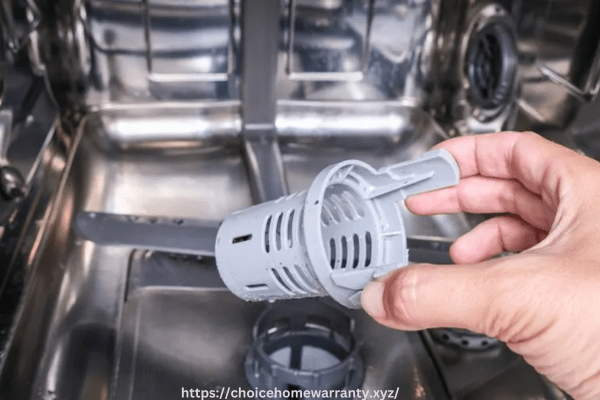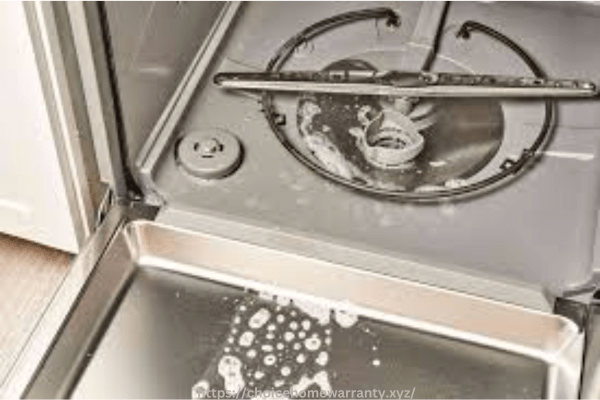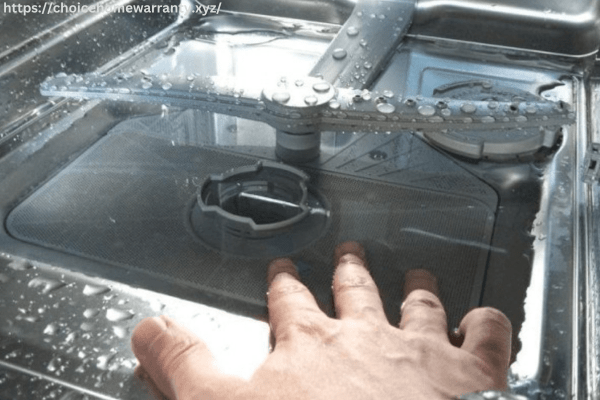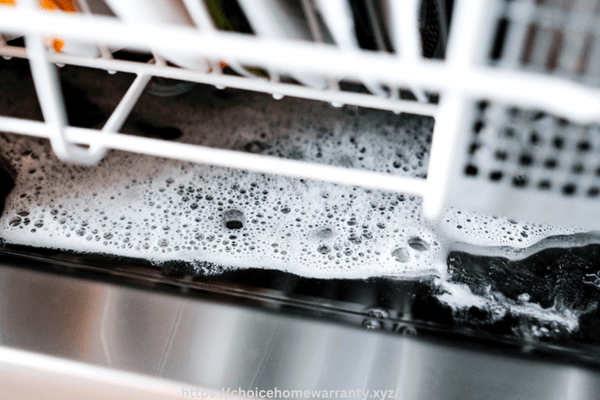When your dishwasher not draining properly, it’s more major than a mere wearisome annoyance. Left unaddressed, standing water can lead to foul odors and even harmful bacteria growth, affecting your food hygiene – the last thing anyone wants! The causes behind this common issue can range from simple clogs in the drain filter or hose to faults within the pump or timer not allowing for effective dispersion.
The good news is that you don’t always need to rush off dialing a repair service when confronted with these pesky puddles. Many of these problems are solvable with some handy DIY techniques that require just basic know-how and minimal equipment. Instead of letting ‘Dishwasher Not Draining’ hamper your day, step up as the master of this household appliance and restore harmony to your kitchen!
Common Causes of Dishwasher Not Draining
There are several common causes for a dishwasher not draining. One of the most frequent issues is a clogged drain or filter, which obstructs the flow of water. Another possible problem could be a defective drain pump or a high drain loop issue. If the dishwasher’s door latch switch isn’t functioning properly, it might also prevent the appliance from draining.
Furthermore, problems with the dishwasher’s software such as using the wrong settings can cause drainage issues. Lastly, issues with your home’s plumbing system can also lead to your dishwasher not draining correctly.
Clogged Filter
One of the primary culprits behind a dishwasher not draining is a clogged filter. Over time, debris and food particles can accumulate in the filter, hindering water flow and subsequently causing drainage problems. If left unaddressed, this issue can severely compromise the functionality of the dishwasher.
Blocked Drain Hose
A blocked drain hose can significantly inhibit the water from properly flowing out of the dishwasher, resulting in a dishwasher that’s not draining. Therefore, it is crucial to routinely inspect this component for any potential obstructions. Regular inspection and maintenance can ensure your dishwasher operates at maximum efficiency and prevent unnecessary damages or breakdowns.
Malfunctioning Drain Pump
The drain pump in a dishwasher plays a vital role in its operation, specifically in the expulsion of water from the machine. However, when this component malfunctions, it can lead to significant drainage problems. One common issue that arises, as a result, is the dishwasher not draining correctly or even at all. This issue can hinder the overall performance of the appliance and may require immediate repair or replacement.
Garbage Disposal Issues
Garbage disposal issues can adversely affect the functioning of connected dishwashers, as they often share a common drainage system. The drainage of the dishwasher may be significantly impacted if there are issues with the disposal unit. This may result in problems like improper dishwasher drainage, which can cause a great deal of difficulty.
Incorrect Installation
A bad installation can cause several problems, especially with your dishwasher’s drainage system. An incorrect installation may cause the water to not be pushed out effectively, which might prevent your dishwasher from emptying correctly. This inefficient draining could potentially damage the appliance and affect its overall performance.
Clean the Air Gap
The air gap is a small but important part that has to be cleaned when you clean your dishwasher. This component may get blocked over time and prevent your dishwasher from operating as intended. Take it out and give it a good cleaning with a hard brush for best results. Furthermore, ensure that the dishwasher’s drain line is clear of any obstacles by giving it a thorough inspection. If these instructions are not followed, you may have incorrect dishwasher emptying.

Steps for Troubleshooting
There are a few troubleshooting techniques you may try if your dishwasher isn’t emptying. First, check to see if the drain or filter is free of any debris or blockages preventing the water from draining. If it doesn’t work, check the drain line for any bends or kinks that could be stopping the water from flowing.
It’s also important to confirm whether the dishwasher’s pump is functioning correctly; a faulty pump will prevent drainage. Finally, make sure all of the settings on your dishwasher are accurate. Sometimes, a misconfigured option prevents the machine from emptying correctly. If none of these solutions work, you might require expert assistance to identify and resolve the issue.
Check for Clogs in the Filter
Start by examining the filter of your dishwasher for any potential clogs. This means removing any debris that has accumulated over time. To ensure that there are no remaining particles of filth and that the water flow is unobstructed, make sure you give it a thorough rinse. Correctly emptying the dishwasher might be a key source of the issue, which could be resolved by fixing it.
Inspect the Drain Hose
Begin by inspecting the drain hose of the dishwasher. Look closely for any kinks or obstructions that could be preventing the water from flowing. Verify that it is linked appropriately to the drainage systems of the washbasin and the dishwasher. Incorrect connections frequently result in poor draining of the dishwasher. After examining these possibilities, if you still find that your dishwasher is not emptying, there may be more serious problems that need to be fixed.
Test the Drain Pump
To examine why your dishwasher not draining, it’s crucial to test the drain pump. You can do this by running a diagnostic test on the drain pump itself. First, unplug the dishwasher for safety reasons.
The pump is the next item to locate; it is usually around the bottom of the machine. After you’ve found it, carefully examine it to check for any evident damage or blockages that might hinder its operation. Should such issues arise, they may be the reason behind the incorrect draining of your dishwasher.
Examine the Garbage Disposal
Upon experiencing issues with your dishwasher not draining, it is crucial to inspect the garbage disposal system if they are interconnected. The functionality of the garbage disposal can directly affect the drainage system of your dishwasher.
If there are any obstructions or clogs within the garbage disposal, make sure to clear them out thoroughly. Afterward, run the disposal to verify that it’s operating correctly and facilitating correct drainage. This step could potentially resolve issues about your dishwasher not draining.
Verify Proper Installation
It is essential to verify the proper installation of your dishwasher as an initial troubleshooting step, particularly if you’re experiencing issues with the appliance not draining. Double-check that the drain hose has been positioned correctly according to manufacturer guidelines – this component plays a crucial role in removing water from the unit.
Additionally, ensure that your dishwasher is level; an unbalanced or unevenly installed unit can create potential drainage problems. Remember, an improperly installed dishwasher might be the root cause of drainage complications.
DIY Solutions for a Dishwasher Not Draining
You may attempt several do-it-yourself fixes if your dishwasher isn’t emptying before hiring a specialist. To begin with, make sure the drain tube is not kinked or obstructed. If this doesn’t solve the problem, look for potential obstructions in the drain pump or check if the filter is blocked.
You might also need to examine the check valve to see if it’s stuck closed. In some cases, a failing drain pump or a faulty timer could be causing the issue. These simple DIY troubleshooting steps can save you both time and money when dealing with a dishwasher not draining properly.
Cleaning the Filter
Regularly cleaning the dishwasher filter is crucial to prevent the buildup of debris. A clean filter aids in efficient drainage, ensuring that your dishwasher operates optimally. If your dishwasher is not emptying properly, a blocked filter may be the cause. For this reason, regular appliance maintenance should include keeping your dishwasher’s filter clean.
Unclogging the Drain Hose
Unclogging the drain pipe is one way to fix a non-draining dishwasher. This is readily accomplished by clearing any obstructions in the hose with a wire hanger or plumbing snake. It is crucial to ensure that there are no obstructions in the hose for the optimal water flow. Thus, remember to inspect your drain line if your dishwasher is having trouble emptying correctly.
Testing and Repairing the Drain Pump
If your dishwasher not draining, it could be due to a malfunctioning drain pump. It is essential to test the drain pump to diagnose the issue accurately. If the drain pump is found defective during the testing process, it may require repair or replacement. Thus, by testing and repairing the drain pump, you can resolve the problem of your dishwasher not draining effectively.
Garbage Disposal Maintenance
Maintaining your garbage disposal is essential in keeping it in good condition. This can be achieved by running it regularly and clearing any clogs promptly. These steps will ensure that the drainage process operates smoothly. Conversely, an improperly emptied dishwasher might indicate that your waste disposal system needs to be serviced.
Reinstalling the Dishwasher Properly
You need to act right away if you think your dishwasher’s malfunctioning because of installation problems. Before anything else, refer to the user handbook since it usually contains instructions on correct installation and troubleshooting techniques. It offers thorough instructions that are very beneficial for identifying and fixing the problem.
It is strongly recommended that you seek expert assistance if you are uncomfortable doing the work alone or if following these instructions does not result in a solution. Trained technicians have specialized knowledge and experience to properly reinstall your dishwasher and fix any draining issues efficiently without causing further damage.

When to Seek Professional Help
It’s important to consider whether you need professional help, especially if you’re utilizing appliances like your dishwasher. You need to contact a professional when your dishwasher is not emptying properly.
This might indicate a serious issue with the plumbing or mechanics of the appliance, which has to be appropriately identified and fixed. Therefore, don’t hesitate to call a professional if your dishwasher isn’t draining as it should; attempting to fix it yourself might ultimately result in more damage and needless expenses.
Persistent Drainage Issues
Persistent drainage issues can be a frustrating problem to deal with. If your dishwasher not draining properly and the issue continues despite your best DIY attempts, it may be time to bring in a professional technician. They have the knowledge and experience necessary to diagnose and resolve complex drainage problems effectively, ensuring that your dishwasher returns to its optimal functioning state.
Unusual Sounds During Operation
Unusual sounds during the operation of your dishwasher could be a sign of a more serious problem. When your dishwasher makes odd noises, it may be a symptom of serious problems that should not be disregarded. It’s best to have a professional examination in these situations so that the issue may be correctly identified and fixed. Not to mention, improper dishwasher draining is another major problem that needs to be fixed right away.
Visible Leaks or Water Pooling
Visible leaks or water pooling around the dishwasher are clear indicators of a potentially serious problem that demands immediate professional attention. This can be a worrying indication that the emptying of your dishwasher isn’t working properly. These kinds of problems shouldn’t be disregarded since, if neglected, they may result in more serious harm.
Tips for Preventing Dishwasher Drainage Problems
Preventing dishwasher drainage problems is crucial to maintain the efficiency of your appliance. If your dishwasher not draining, it could be due to several issues such as clogged filters, blocked drain hose, or pump problems.
Regular cleaning and maintenance can prevent these issues from occurring. Ensure that you clean the filters routinely, check for any blockages in the drain hose, and get your pump checked if you’re facing consistent drainage problems. By following these tips, you can prevent the most common dishwasher drainage issues and prolong the life of your appliance.
Regular Maintenance
To keep your dishwasher in optimal condition, it is crucial to establish a regular maintenance schedule. Regular maintenance routines not only enhance the performance of your appliance but also increase its longevity.
One common issue that many people face with dishwashers is the problem of the dishwasher not draining. This can be due to various reasons such as blocked filters or a faulty drain pump. Therefore, regular maintenance checks can help identify and resolve such issues promptly, ensuring your dishwasher runs efficiently.
Proper Loading of Dishes
The proper loading of dishes is crucial for the effective functioning of a dishwasher. Overloading the dishwasher might interfere with optimum water circulation, which is essential for effective draining.
Dishwasher overloads can cause problems including improper drainage, which can leave a pool of water at the bottom of the machine stagnant. Therefore, it’s crucial to make sure that dishes are loaded appropriately to preserve your appliance’s durability and best efficiency.
Avoiding Excess Detergent
Avoid using too much detergent to prevent problems like your dishwasher not emptying. Always use the recommended amount of detergent and adhere to the manufacturer’s instructions.
Excessive detergent use can cause soap residue to accumulate in the dishwasher, which can interfere with the dishwasher’s appropriate drainage mechanism. Therefore, appropriate usage of detergent not only enhances the efficiency of your dishwasher but also prevents potential problems related to drainage.
Checking Water Supply
To ensure the effective functioning of your dishwasher, particularly in terms of its draining process, it is crucial to check the water supply regularly. An adequate and consistent water supply is necessary as it facilitates seamless drainage operation. Without this consistency, you may encounter issues such as the dishwasher not draining properly or not draining at all, which can lead to further complications with your appliance.
Importance of Timely Repairs
It is impossible to overestimate the significance of prompt maintenance, especially when addressing equipment like dishwashers. For example, improper dishwasher emptying may eventually result in more significant problems.
These can include potential electrical problems, water damage to your house, and decreased appliance efficiency. In addition, food debris and standing water can create an unhygienic environment by acting as a haven for germs. Therefore, addressing repair needs promptly not only preserves the longevity of your dishwasher but also safeguards your home environment.
Avoiding Further Damage
Timely resolution of drainage problems is essential to avoiding more dishwashing damage. A dishwasher that is not properly emptied might harm other components, reducing its lifespan and decreasing its overall performance. Because of this, it’s important to deal with drainage problems as soon as they arise to avoid the need for more involved and costly repairs or replacements.
Prolonging Dishwasher Lifespan
Regular maintenance and timely repairs are fundamental for prolonging the lifespan of your dishwasher. However, a common issue that many face is the dishwasher not draining properly. This problem can be a hindrance, but it’s vital to address it immediately to prevent further damage and maintain the appliance’s efficiency.

Ensuring Hygienic Dishwashing
Keeping up hygienic dishwashing practices is crucial for the health and happiness of your household. This depends on keeping the drainage system of your dishwasher in excellent operating order since it has a significant impact on how clean and germ-free your dishes are.
If your dishwasher not draining properly, food particles and bacteria may accumulate, compromising the sanitation of your equipment. It’s crucial to check that your dishwasher’s drainage system is performing at its peak as a result.
Conclusion
A dishwasher that won’t empty might have several reasons, such as blocked drain tubes, clogged filters, and broken drain pumps. These problems are typically straightforward to diagnose, and they frequently call for easy replacement or cleaning tasks that you can perform on your own.
However, if the problem persists even after attempting these solutions, it may indicate a more serious underlying issue that requires professional help. It’s crucial to address this problem promptly to avoid further damage and ensure optimal functionality for your appliance. Therefore, never hesitate to consult with a professional appliance repair service if you’re unsure about fixing the problem on your own.
FAQs About Dishwasher Not Draining
Why is my dishwasher not draining after a cycle?
Your dishwasher could not be draining after a cycle for a few different causes, such as a malfunctioning drain pump, clogged filter, or blocked drain line. Follow the troubleshooting steps to identify the issue and resolve it.
Can I repair the drain pump myself?
While some minor drain pump issues can be resolved by DIY methods, it’s recommended to consult a professional technician for a thorough inspection and repair.
How often should I clean the dishwasher filter?
Cleaning the dishwasher filter every month is advisable to prevent debris buildup and ensure efficient drainage.
Is it normal to hear some noise during dishwasher operation?
Minimal noise is normal, but unusual or loud sounds may indicate an underlying problem. Seek professional.
Why is standing water a common issue in dishwashers?
Standing water can result from clogs in the drain, sink, or garbage disposal, hindering the dishwasher’s drainage system.
How often should I run the dishwasher’s drain cycle?
Running the drain cycle once a month helps prevent clogs and ensures smooth dishwasher operation.
Can I use other substances to clear clogs besides baking soda and vinegar?
Yes, commercial drain cleaners can be used, but they may contain harsh chemicals that can damage pipes over time.
What should I do if DIY fixes don’t work?
If issues persist, it’s advisable to consult a professional dishwasher technician for a thorough inspection.
Does a home warranty cover dishwasher repairs?
Some home warranties cover plumbing, which may include dishwasher repairs. Check your policy to determine coverage.
